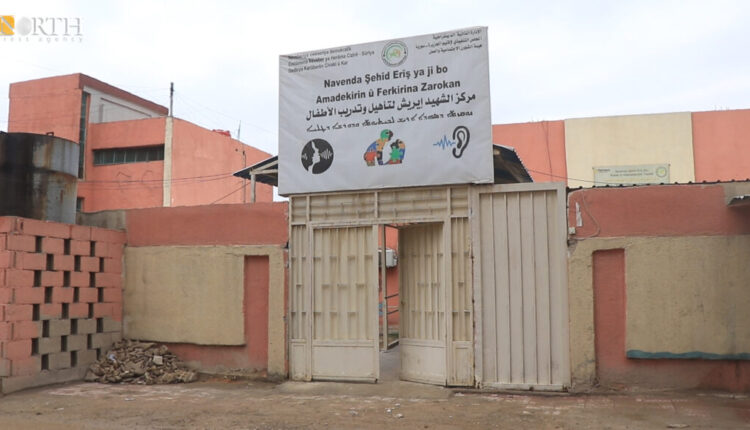
QAMISHLI, Syria (North Press) – In a center for people with special needs in the city of Qamishli, northeast Syria, the 13-year-old Jiyan, who has brain atrophy, is busy stringing pearls on a thread to make jewels in order to develop her abilities and help her integrate into society.
Anoud Hussein, Jiyan’s mother, told North Press while visiting the Martyr Erish Center that she is glade regarding the center, “Jiyan’s behavior in home has improved.”
She added, “Children are benefiting from it [the center] and having fun.”
With the aim to rehabilitate and train children with special needs and reintegrate them into society, Social Affairs and Labor Bard of the Autonomous Administration of North and East Syria (AANES) opened two centers one in Qamishli and another in Hasakah in 2021.
The Martyr Erish Center, which provides services for free, includes several departments such as those for people with hearing and speech disabilities, Autism, Down syndrome and learning disabilities.
An estimating 30 children are registered in the center.
During the entertainment session, children of varying ages sway and dance to folk songs in an atmosphere of joy and pleasure in a yard in the center.
Mizgin Saleh, mother of Barfin, who suffers from mental retardation, expressed her pleasure regarding the rehabilitation programs adopted by the center.
She told North Press, “It is good for her [Barfin] as she learns a lot, we are happy about the center.”
A training team supervises the center, which adopts a rehabilitation and schooling system since a lot of the children demonstrate a remarkable capacity for learning, taking into consideration conditions of each child, Jinan Ahmed, manager of the center, said.
Additionally, entertaining activities are held in the center, according to Ahmed.
She told North Press that the center faces many difficulties the most notable of which is lack of space and rehabilitation centers for children. The center is in school attached building in al-Gharbiya (western) neighborhood.
She noted, “We suffer because of lack of similar centers, which put a lot of pressure on us.”
She added, “We have many registered students that we cannot receive because of the small space here.”
It is the only center in the region to receive “children between 12 and 18 years old,” according to the manager of the center.
There are two other centers, one of which is for the children with disabilities in Qamishli.
Though accurate statistics of the people with special need in Qamishli are not available, many wait to be supported and cared for in light of lack of centers to embrace them in the city, according to residents.
The AANES exerts efforts to provide them with support and open new rehabilitation centers, but “insufficient annual budget” for the Social Affairs and Labor Board curbs such projects, Jamil Zaher, Deputy Head of the board in Jazira Region, said.
Zaher noted that the board, in coordination with World Health Organization (WHO) and other local ones, provides Hearing aids for people with hearing impaired from the age of 1 to 18 years old, and wheel chairs for those with spina bifida.
He added that the goal of these centers that are affiliated to the board is to “rehabilitate and reintegrate people with simple mental retardation who suffer from speaking and hearing difficulties and autism.”
The centers are supervised by “training teams,” according to Zaher.
He highlighted the urgent need for specialized cadres in these centers that can deal with such cases of disabilities.
He said what foils efforts for succeeding such projects is the lack of support to people of determination to perform surgeries if needed since “costs go beyond the board abilities.”
He went further adding that organizations operating in the region “provide help and support to some cases only in camps the most in need.”
The deputy head of the Social Affairs and Labor Board noted that two centers for people with special needs are intended to be established in the towns of Shaddadi and Amuda, but “this is related to the general budget.”
